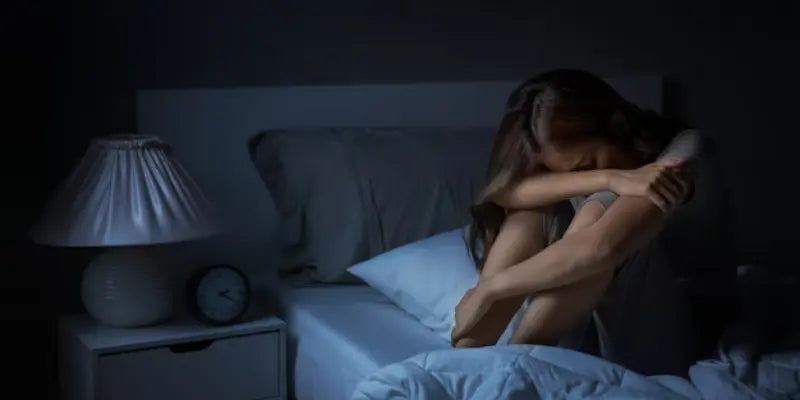
Should You Try Binaural Beats To Help You Sleep?
Sound has a powerful effect on the brain. Different noises can pump you up or help you chill out. Some sounds even change how your body works. Music with a slow beat calms your nerves and makes it easier to fall asleep.
Calming sounds such as sound baths or colored noises, help you relax. Brown, pink, and white noise can make your sleep better. Binaural beats are another viable option. Binaural beats are not music. Your brain creates them when it hears different tones in each ear.
Binaural beats lower anxiety and improves sleep. This guide talks about it in detail, every crucial aspect related to it, and how it influences sleep and relaxation.
What are Binaural Beats for Sleep: A Brief Overview?
No. Not any music. Binaural beats for sleep are not categorized under any music group. They use two frequencies with a slight difference to make you hear a new tone.
The brain picks up on a single tone based on how the two frequencies differ. It "adjusts" to this frequency. You need headphones to listen to binaural beats.

Each of the ears gets a different frequency often with soothing background noises. In case the left ear hears 300 Hz and the right ear listens to 280 Hz, the brain treats 10 Hz tone. This low-frequency wave is inaccessible but still impacts the brain.
Binaural heartbeat promotes sleep and relaxation by changing brain activity. Studies have found that they reduce tension and slow brain waves, boost relaxation, cut down anxiety, and enhance sleep quality.
For example, one ear belongs to 300 Hz, and the other consultation results in 310 Hz in the tone of 10 Hz. This method works if each signal is transferred under 1000 Hz and the difference is less than 35 Hz.
How do Binaural Beats Work?
Binaural beats for sleep have an impact on our brain waves, and comprehending how the brain waves work helps us interpret why it happens.
Brain waves are created with the help of electrical impulses from neurons. Neurons are formation blocks for the brain. When we reason, sense, or do something, these neurons turn active. Our feelings and actions shape the patterns of these brainwaves.
There are four primary types of brain wave frequencies, and they can be influenced by our feelings and the environment. Binaural Beats can also affect these frequencies.
Beta-Frequency Waves
Beta waves enhance alertness and focus. They help with decision-making and analytical thinking.
These waves play a poignant role in problem-solving or during discussions. High beta levels are connected to anxiety. They increase concentration but can cause stress. Excessive beta activity can lead to restlessness and overthinking.
Beta brain waves promote your vigilance and concentration, making you more focused. They are important for handling decisions and rational thinking. When you solve a problem or dive deep into conversations, these brainwaves play a key role.
Alpha-Frequency Waves
Alfa waves help you open your thoughts but still stay sharp and conscious. They are in the 9-14 Hz zone and appear when the brain is in a calm state.
These brain waves are bound by a meditative zone, especially in meditation and creativity. People who do yoga are often in this alpha condition. In addition, alpha waves help to reduce stress and increase attention for more balanced mental state to cope with problems.
Theta-Frequency Waves
Theta Waves, occur during the light Non-Rapid Eye Movement (NREM). These waves promote the status of deep relaxation. Compared to alpha waves, these waves are slower and fall within the 5-8 Hz area.
However, the Theta waves appear during deep meditation and dominate half of the dreams during sleep. In addition, Theta Wave activity increases creativity and memory processing. These waves also support emotional treatment and stress reduction.
Delta-Frequency Waves
Delta waves are slow and have low frequency, which is from 1.5–4 Hz. They arise in deep sleep and deep meditation.
These waves dominate dreams under NREM sleep. Delta activity supports physical treatment and memory consolidation. High Delta levels enhance sleep quality and general welfare.
How Binaural Beats for Sleep Impacts Brain Waves: An Overview
Quicker brain waves boost alertness and step up readiness. Slower waves, on the other hand, endorses relaxation and sleep.
Sound waves impact the brain wave patterns. The brain gets on the same page with the particular frequencies via entrainment. Scientists have analyzed this effect for many years. Binaural beats for sleep use this principle to augment relaxation, sleep, and focus.
Note: Different frequencies take aim at specific mental states and cognitive abilities.
Brain Wave Entrainment
The process of Brain wave entrainment signifies that binaural beats influence brain functions. The low-frequency tones get the ball rolling for alpha, theta, and delta waves.
These waves endorse relaxation and elevate sleep quality. Binaural beats for sleep assist the brain to step into a restful state.
Binaural Beats for Sleep and Brainwave Synchronization
Researchers have perceived that sound waves impact brain wave patterns. Studies suggest that binaural beats synchronize brain waves with their specific frequencies.
Low-frequency beats foster relaxation. These beats generate slower brain waves, paving the way for a calm mental state and boost sleep quality.
Also Read:- How to Wake up Early in the Morning?
How do Binaural Beats for sleep benefit the mind?
Binaural beats create a soothing and relaxed mental state. They work quicker and provide several benefits, such as:
- Minimize anxiety
- Enhance focus and concentration
- Cut down stress
- Elevate relaxation
- Improve mood
- Boost creativity
- Assist pain handling
Meditation calms the agitated mind and curtails random considerations. Binaural beats accomplish similar effects via sound. Regular use is likely to enhance overall mental well-being.
Meditation minimizes stress, delays brain aging, enhances mental health, and augments focus. Regular practice is challenging, so people use technology for help.
Binaural beats between 1 and 30 Hz mimic brain wave patterns found in meditation. The brain matches with the sound frequency.
Binaural beats aid in creating brain waves linked to meditation. This method is termed Brain Wave Entrainment Technology. It helps in mental relaxation and clarity. Many users convey about deeper focus and enhanced emotional stability. Regular listening may reinforce cognitive functions over time.
Does Binaural Beats Assist During Sleep?
Attending to delta frequency binaural beats (3 Hz) boosts delta brain activity. Delta waves are crucial for deep sleep and morning dynamism.
These beats are useful for expanding deep sleep hours without interruptions.
A study conducted in 2021 found that music listening, regardless of personal preference or neutrality, is capable of decreasing cortisol levels significantly in patients in both settings: home and laboratory. With increasing relaxation response, lower cortisol secretion is evident. This denotes a better quality of sleep.
Studies show that music has beneficial effects on the mental aspects. Among 349 studies reviewed, 68.5% of the treatments related to music were helpful for conditions such as schizophrenia, bipolar disorder, and depression.
Mood improvement, anxiety reduction, and enhanced emotional stability are positive effects of music therapy.
Also Read:- 10 Tips to Enhance Your Sleep Quality
What are the Side Effects/Disadvantages of Binaural Beats on Sleep?
Binaural beats usually do not have any negative effects. However, overuse of loud volumes can pave the way for hearing loss.
Intense exposure to sounds that exceed either 85 or more decibels leads to an individual suffering from hearing loss compared to the noise of heavy traffic.
Before someone with epilepsy could undergo treatment with binaural beats, it is vital to check with a doctor first. There is also a need for further study concerning the long-term effects of binaural beats.
Those individuals who suffer from sensitive hearing as well as people who suffer from Tinnitus can proceed with using it. Keeping the volume on a decent level ensures that it is used safely and effectively.
Final Words
Medical and psychological therapies create various ways to improve sleep. However, Binaural Beats provides a low-risk and cheap alternative. They induce the relaxation of body muscles and the enhancement of sleep quality.
You simply have to wear your set of headphones to experience binaural beats. In due course, it might just improve sleep patterns and the quality of rest one gets. Consult your healthcare provider before indulging in these therapeutic beats.
FAQs
Q1: Which binaural beats are ideal for sleep?
Ans: Beats between 1 and 4 hertz are helpful for deep sleep. Beats between 4 and 8 hertz facilitate rapid eye movement sleep, lower anxiety, and aid in meditation.
Q2: What is the best Binaural Beat for sleep?
Ans: It's impossible to find the best binaural beat for sleep. Each frequency will carry a different effect on each sleep stage. Some specific beats may promote relaxation and deeper rest.







